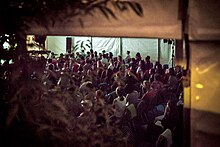China Women's Film Festival

The China Women’s Film Festival (CWFF 中國國際女性影展) was established in 2013 [1] as an annual event. It aspires to promote women’s rights and raise awareness of gender inequality through the mediums of film and art.[2] The festival is organised by the Crossroads Centre Beijing, a Chinese NGO that aims to raise awareness on human rights issues in China.[3]
Background[]
The China Women's Film Festival() is an intercultural educational event, featuring a diverse range of films from predominantly female filmmakers from around the world. The festival aspires to raise awareness on the issues faced by women in China via events such as: film screenings, forums and Q&A sessions, and with the participation of filmmakers, feminists and other guests.[4]
The CWFF takes place over 9 days every September,[5] commencing in Beijing and touring through various cities in China for several months, focusing predominantly on second tier cities to increase awareness in less globalised locations. The first CWFF took place in 2013 [6] across 5 cities and was the first event on such a scale focusing on film alongside women's issues in China. The next editions were a far greater success attracting a larger audience and continuing to show rapid growth.[7]

Goals[]
The festival seeks to bolster women’s place in society in aspiration of empowering them, placing women in public visible leadership roles and educating people on the importance of an equal and diverse society.[8] The festival provides an alternative voice, debate and focal point for media attention around the topic of women’s rights. It also provides a platform for female filmmakers to show their film and share their experience with the audience.[9]
The tour aims to expand the opportunity and freedom for people to access and attend the event in cities where the opportunity to learn about such issues is rare or non-existent.[10]
Awards[]
In 2014 the festival won 2nd prize in the Intercultural Achievement Award, assigned by the Austrian Ministry of Foreign Affairs. The Intercultural Achievement Award is motivated by intercultural dialogue with the purpose of identifying and honouring non-profit organisations and pioneering projects constructed around education, participation and business.[11]
Supporters[]
The CWFF cooperates with many partners and sponsors. Since its first edition, the festival has included UN Women China[12] and its HeforShe campaign, foreign embassies in Beijing,[13] international and national film festivals, cultural centres, theatres, universities, cafes and bookstores.
See also[]
External links[]
China Women’s Film Festival Official Website
References[]
- ^ Lopez, Jutsine. "China Women’s Film Festival Lands in Beijing", , Beijing, 19 September 2016. Retrieved on 23 April 2017.
- ^ The Beijinger. "China Women’s Film Festival Aims to Promote Gender Equality, Sep 18-25", The Beijinger, Beijing, 18 September 2016. Retrieved on 23 April 2017.
- ^ Robbins, Adam. "Community: The Crossroads Centre" Archived 2017-04-24 at the Wayback Machine, City Weekend, Beijing, 14 May 2015. Retrieved on 19 April 2017.
- ^ Watt, Louise. "Chinese Film Festival pushes for end to Gender inequality", AP News, Beijing, 21 September 2016. Retrieved on 23 April 2017.
- ^ Borak, Masa. "China Women’s Film Festival: Changing Perspectives on Women in China", , Beijing, 5 November 2016. Retrieved on 23 April 2017.
- ^ Watt, Louise. "Chinese Film Festival pushes for end to Gender inequality", AP News, Beijing, 21 September 2016. Retrieved on 23 April 2017.
- ^ Zhou, Gretchen. "Women’s Film Festival Brings Hard-Hitting Stories to Big Screen " Archived 2018-03-02 at the Wayback Machine, The Beijinger, Beijing, 20 September 2016. Retrieved on 23 April 2017.
- ^ BBC Entertainment and Arts. "Chinese women’s film festival calls for gender equality", The BBC, London, 21 September 2016. Retrieved on 22 April 2017.
- ^ SCMP. "Chinese women’s film festival pushes for end to gender inequality", The South China Morning Post, Beijing, 20 September 2016. Retrieved on 22 April 2017.
- ^ Borak, Masa. "China Women’s Film Festival: Changing Perspectives on Women in China", , Beijing, 5 November 2016. Retrieved on 23 April 2017.
- ^ IAA. "INTERCULTURAL ACHIEVEMENT AWARD 2014" Archived 2017-04-24 at the Wayback Machine, Intercultural Achievement Award, Austria, March 2014. Retrieved on 24 April 2017.
- ^ UN Women China. "UN Women: Asia and the Pacific", UN Women, Online. Retrieved on 22 April 2017.
- ^ SCMP. "Chinese women’s film festival pushes for end to gender inequality", The South China Morning Post, Beijing, 20 September 2016. Retrieved on 22 April 2017.
- Film festivals established in 2013
- Film festivals in China
- Annual events in China
- 2013 establishments in China
- Women's film festivals
- Women in China